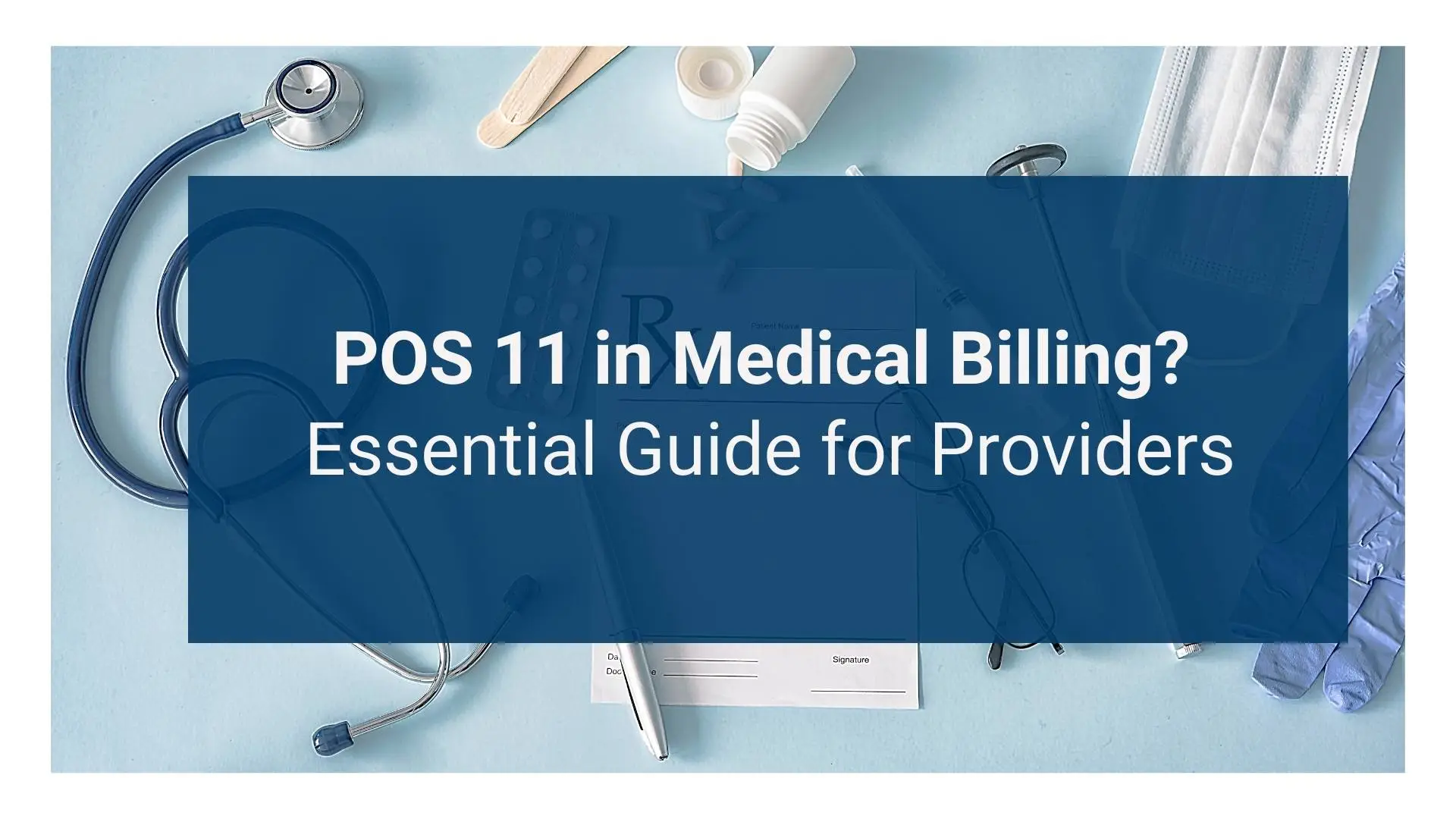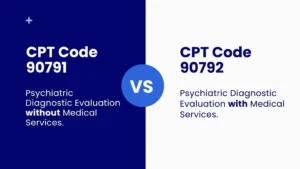POS 11 in medical billing, or Place of Service 11, a key factor in determining claims accuracy and reimbursement rates. Medical billing and coding can be complex, but understanding vital codes and processes is crucial for healthcare providers aiming to maximize efficiency and revenue. For example, POS 11 means a doctor’s office. So when your doctor sends a bill after your check-up, it will say POS 11 to show where you were seen.
In this guide, we’ll take a deep dive into POS 11, exploring its significance in medical billing, its impact on reimbursement accuracy, and essential best practices for proper usage.
Whether you’re a healthcare provider, practice manager, or medical billing professional, this blog will provide actionable insights to refine your practice’s billing process and avoid costly errors.
POS Codes in Medical Billing
The Centers for Medicare & Medicaid Services (CMS) assigns specific two-digit Place of Service (POS) codes to identify the location where healthcare services are provided. These codes are called “POS Codes”. These codes help insurers determine the correct reimbursement rates based on the service setting.
POS codes fall into two main categories:
Facility POS Codes
Facility POS codes apply to medical services delivered in structured healthcare institutions such as hospitals or skilled nursing facilities – these are known as Facility POS codes. These settings require proper documentation to ensure accurate billing and reimbursement.
Common facility POS codes include:
- POS 21 – Inpatient Hospital
- POS 22 – Outpatient Hospital
- POS 23 – Emergency Room – Hospital
- POS 20 – Urgent Care Facility
- POS 31 – Skilled Nursing Facility
- POS 32 – Hospice Facility
- POS 24 – Ambulatory Surgical Center
Non-Facility POS Codes
Non-facility POS codes refer to healthcare services provided outside of hospital settings, such as private clinics, physician offices, or patient homes. These codes are used to ensure accurate claim submission for outpatient care.
Common non-facility POS codes include:
- POS 11 – Physician’s Office
- POS 12 – Patient’s Home
- POS 03 – School-Based Services
- POS 49 – Independent Clinic
What Is POS 11 in Medical Billing?
Place of Service (POS) Code 11 is a two-digit code used in medical billing to indicate that services or procedures were provided in an office setting. Specifically, POS 11 designates the provider’s private office as the primary location for outpatient medical services. It is also referred to as 11 place of service or 11 place of service code.
The primary purpose of POS codes in medical billing is to inform insurance payers about the location where healthcare services were delivered, which has a direct impact on reimbursement rates. For example, care provided in a patient’s home, a hospital POS code (POS 21, POS 22 in medical billing, or POS 32), or an outpatient office will each have its respective POS code.
Why Is POS 11 Important?
For healthcare providers operating in outpatient settings like private practices, POS 11 is critical for securing accurate and timely reimbursements. It ensures that payers understand the scope and setting of the services provided, thus facilitating claim processing. Additionally, when encoded correctly, POS 11 can protect against billing discrepancies, denial for POS, and audit risks.
Understanding the Importance of POS 11 for Healthcare Providers
Effective utilization of POS 11 in medical billing brings immediate and long-term benefits to healthcare providers:
1. Streamlined Reimbursements
Insurance payers rely heavily on POS codes like 11 to process claims efficiently. Assigning the correct POS code prevents claim rejections or delays due to mismatched service location information.
2. Compliance With Regulations
Medical billing and coding requires strict adherence to compliance standards. Incorrect coding, including misapplication of POS 11, can lead to regulatory fines, audits, and penalties.
3. Optimized Revenue Cycle Management
A smoothly functioning revenue cycle depends on meticulous coding. By using POS 11 accurately, providers can avoid denial code 11 issues, POS denial, underpayments, or denials, safeguarding their practice’s financial health.
How POS 11 Affects Reimbursement and Revenue Cycle Management
POS 11 directly impacts your practice’s revenue cycle by determining the reimbursement rate for outpatient services.
Here’s why it matters:
- Higher Reimbursement Rates for Office Visits: Compared to services performed in other outpatient facilities, procedures done under POS 11 can have higher reimbursement rates.
- Fewer Claim Denials: Accurate use of POS 11 ensures insurance companies process claims without unnecessary delays, minimizing revenue disruptions.
- Improved Cash Flow: A reliable and accurate billing process accelerates payment cycles, which is crucial for maintaining a healthy operational budget.
Incorrect usage, such as using POS 11 for hospital services (POS 21, POS 32, or POS 20 in medical billing), can lead to costly CO 11 denial code descriptions. For instance, claims flagged with denial code 11 may be rejected for non-compliance.
Best Practices for Accurate and Efficient POS 11 Reporting
Maintaining accuracy in medical billing requires attention to detail and robust processes. Follow these best practices to ensure proper reporting of POS 11:
1. Conduct Regular Staff Training
Ensure your medical billing team understands the current coding guidelines for POS 11 related codes, such as 31 POS, 20 POS, and outpatient POS. Regularly update them about changes in healthcare regulations or payer-specific requirements.
2. Use Advanced Medical Billing Software
Leverage technology to minimize human error. Many medical billing services include automated POS codes validation tools, ensuring accurate submission for claims.
3. Perform Periodic Audits
Regularly auditing medical billing records can help identify and resolve errors in POS 11 reporting before claims are denied.
4. Outsource Your Medical Billing Process
Considering the complexities involved, partnering with a medical billing company can be beneficial. An experienced service provider ensures compliance, speeds up the reimbursement process, and allows your team to focus on patient care.
Common Errors in POS 11 Reporting and How to Avoid Them
Even minor errors in POS 11 reporting can result in revenue disruptions. Here are common mistakes and tips to prevent them:
- Mistakenly Using Hospital POS Codes for Office Services: Ensure office-based procedures are always assigned POS 11, not hospital-specific codes like POS 21 or 22.
- Neglecting Updates to Payer-Specific Guidelines: Insurance payers have unique coding criteria. Regularly check payer updates to avoid errors like assigning POS 12 in medical billing for incorrect settings.
- Miscommunication Between Front Desk and Billing Staff: Implement a streamlined process to share accurate service location details with billing staff to avoid incorrect coding.
By implementing medical billing services with a quality-check process, you can reduce errors related to medical billing POS codes and improve your revenue cycle efficiency.
The Future of POS 11 and Its Impact on Healthcare Billing
The future of POS 11 lies in further automation and innovation within the medical billing industry. With AI-powered coding tools and predictive analytics, healthcare providers can ensure even better accuracy and compliance. Furthermore, the increased emphasis on value-based care will place greater importance on transparency in billing, ensuring that POS codes like 11, 31 POS, and occurrence code 11 remain pivotal to claim submissions and reimbursements.
Stay Ahead With Expert Outsourcing Solutions
Accessing the complexities of medical billing services can be challenging, but you don’t have to do it alone. Implementing robust coding systems and ensuring their accuracy can help unlock significant value for your practice.
Providers Care Billing LLC, based in Illinois, specializes in medical billing and coding services customized for healthcare providers of all sizes. Our team ensures 100% precision in claims submission while offering solutions at a highly competitive rate of just 2.89%. With 100% client satisfaction and an outstanding 4.9-star rating, we can help you safeguard and maximize your revenue cycle.
Contact us today to learn how to optimize your practice’s billing process and begin experiencing hassle-free reimbursements.




